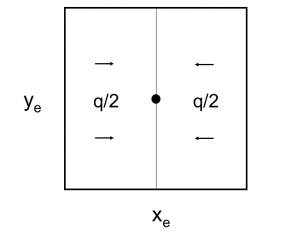Difference between revisions of "6/π stimulated well potential"
From wiki.pengtools.com
(→Math & Physics) |
(→Math & Physics) |
||
| Line 8: | Line 8: | ||
Pseudo steady state flow boundary conditions: | Pseudo steady state flow boundary conditions: | ||
| − | :<math> | + | :<math>\frac{dP}{dx}|_{x=x_e/2} = \frac{dP}{dx}|_{x=-x_e/2} = 0</math> |
:<math> \frac{dP}{dt} =const\ for \ \forall x </math> | :<math> \frac{dP}{dt} =const\ for \ \forall x </math> | ||
Revision as of 10:29, 12 September 2018
Brief
6/π is the maximum possible stimulation potential for pseudo steady state linear flow in a square well spacing.
Math & Physics
Pseudo steady state flow boundary conditions:
From Diffusivity Equation:
 ( 1 )
( 1 )
From Material Balance:
 ( 2 )
( 2 )
( 2 ) - > ( 1 ) :
 ( 3 )
( 3 )
Integrating ( 3 ):
 must satisfy boundary condition:
must satisfy boundary condition:
 ( 4 )
( 4 )
Integrating ( 4 ):
 ( 5 )
( 5 )
Since average pressure is:  :
:
Diff eq
From Mass conservation:
 ( 1 )
( 1 )
From Darcy's law:
 ( 2 )
( 2 )
( 2 ) →( 1 ):
 ( 3 )
( 3 )
 ( 4 )
( 4 )
 ( 5 )
( 5 )
( 5 ) -> ( 4 ):
 ( 6 )
( 6 )
 ( 7 )
( 7 )
Assumption that viscosity is constant cancels out first term in left hand side of (7):
 ( 8 )
( 8 )
 ( 9 )
( 9 )
( 9 ) -> ( 8 ):
 ( 10 )
( 10 )
Term  in (10) is second order of magnitude low and can be cancelled out, which yields:
in (10) is second order of magnitude low and can be cancelled out, which yields:
 ( 11 )
( 11 )
See also
optiFrac
fracDesign
Production Potential
Nomenclature
 = cross-sectional area, cm2
= cross-sectional area, cm2 = thickness, m
= thickness, m = permeability, d
= permeability, d = pressure, atm
= pressure, atm = initial pressure, atm
= initial pressure, atm = average pressure, atm
= average pressure, atm = flow rate, cm3/sec
= flow rate, cm3/sec = length, m
= length, m = drinage area length, m
= drinage area length, m = drinage area width, m
= drinage area width, m
Greek symbols
 = oil viscosity, cp
= oil viscosity, cp












